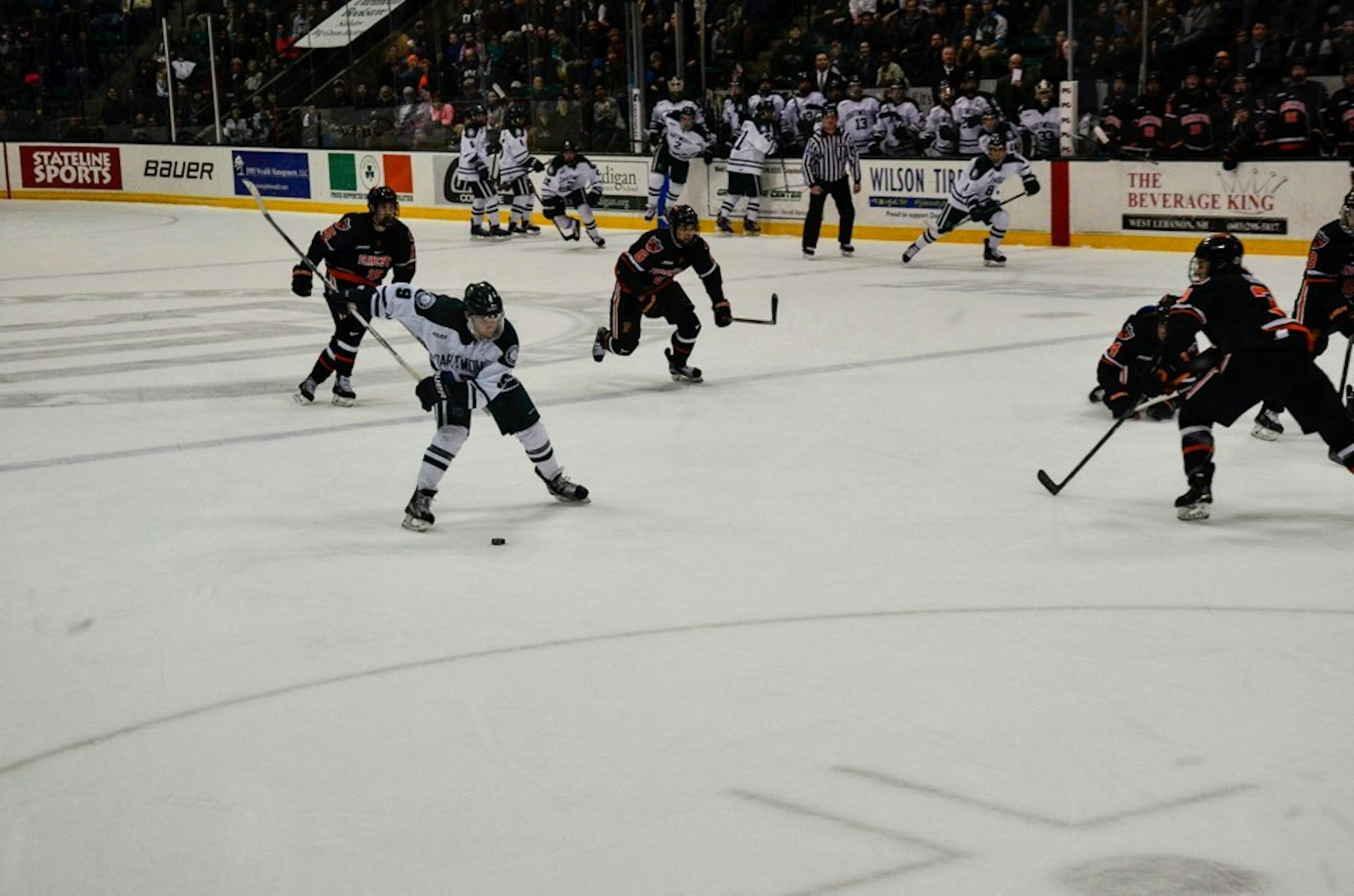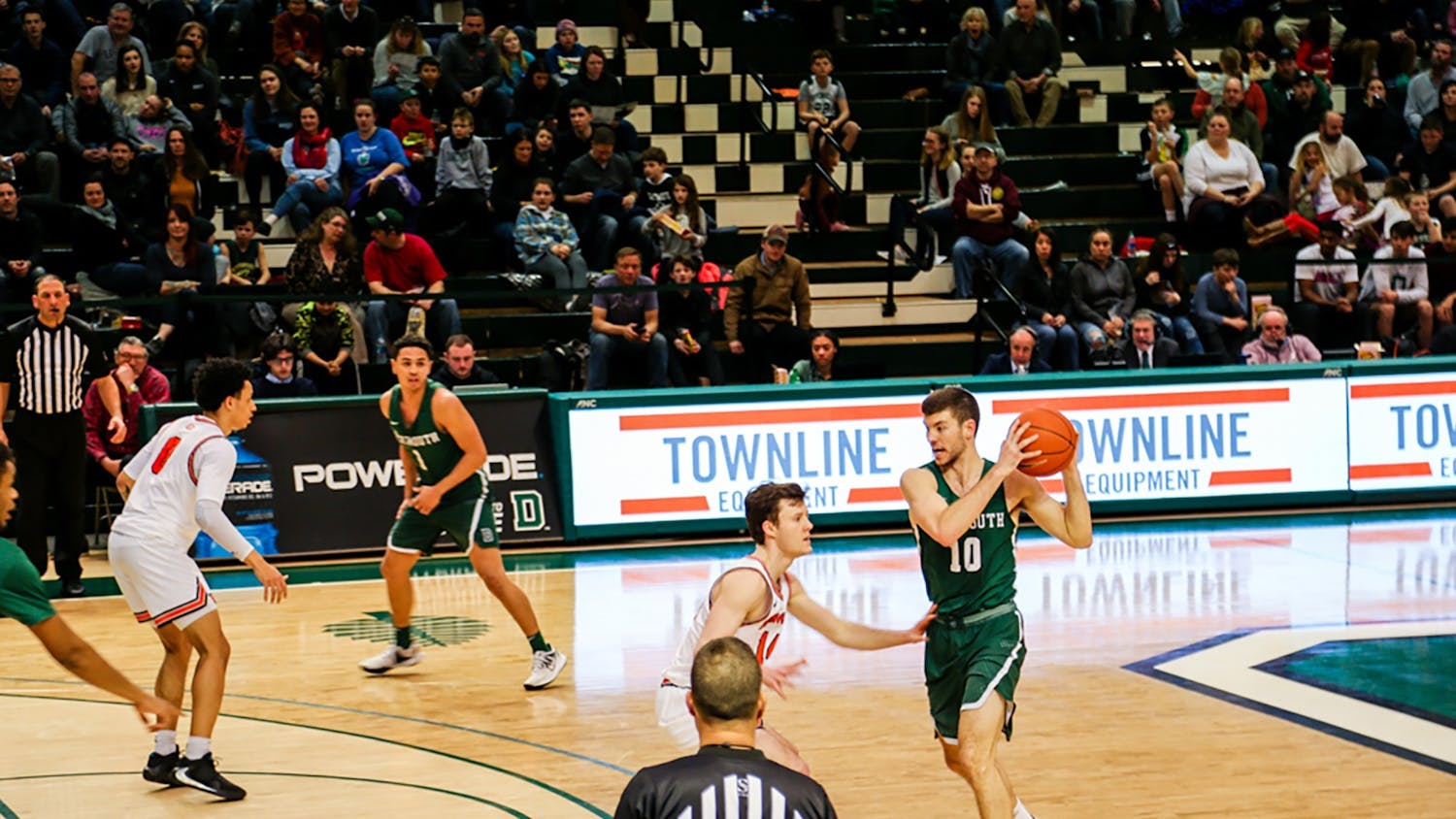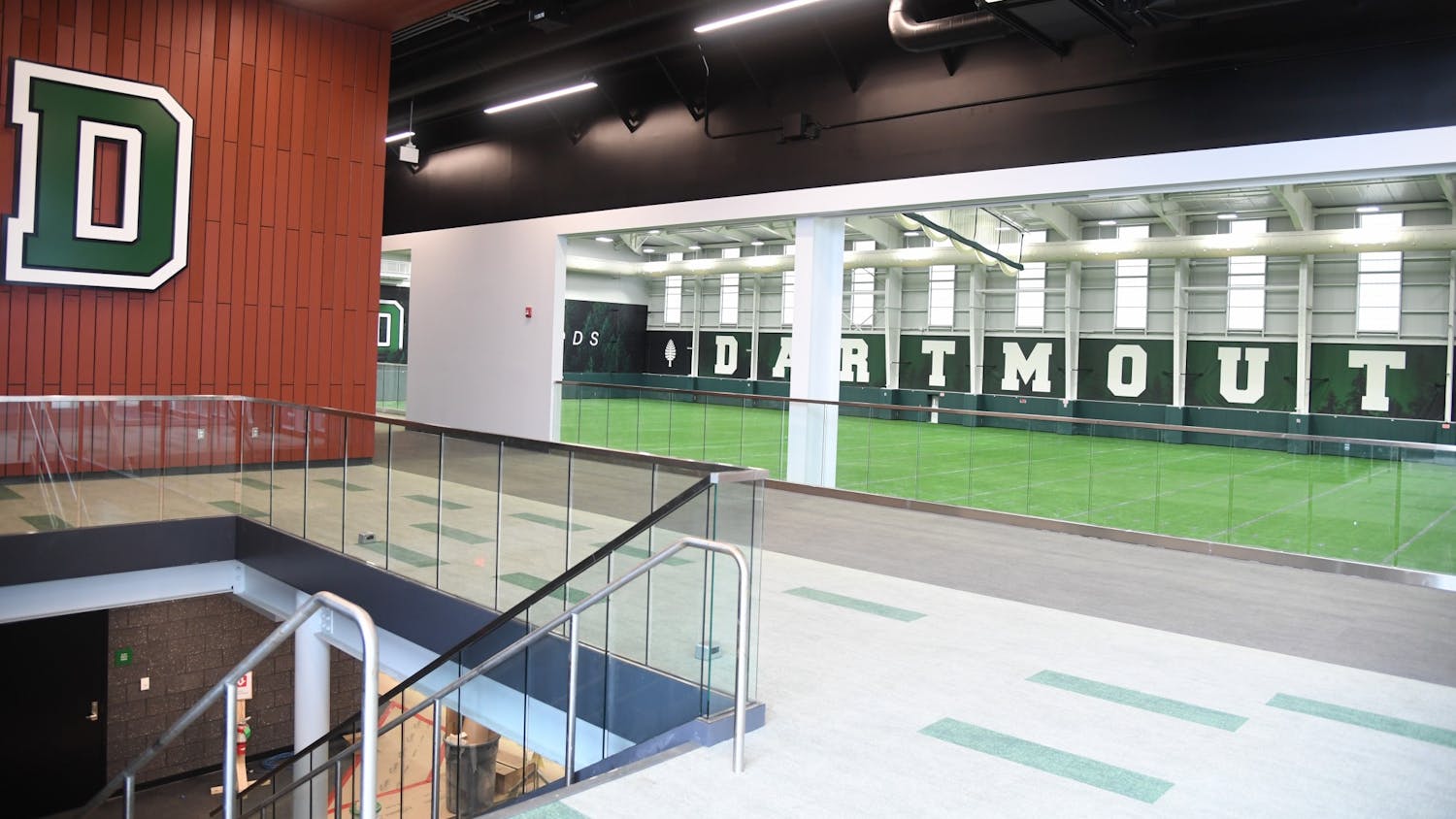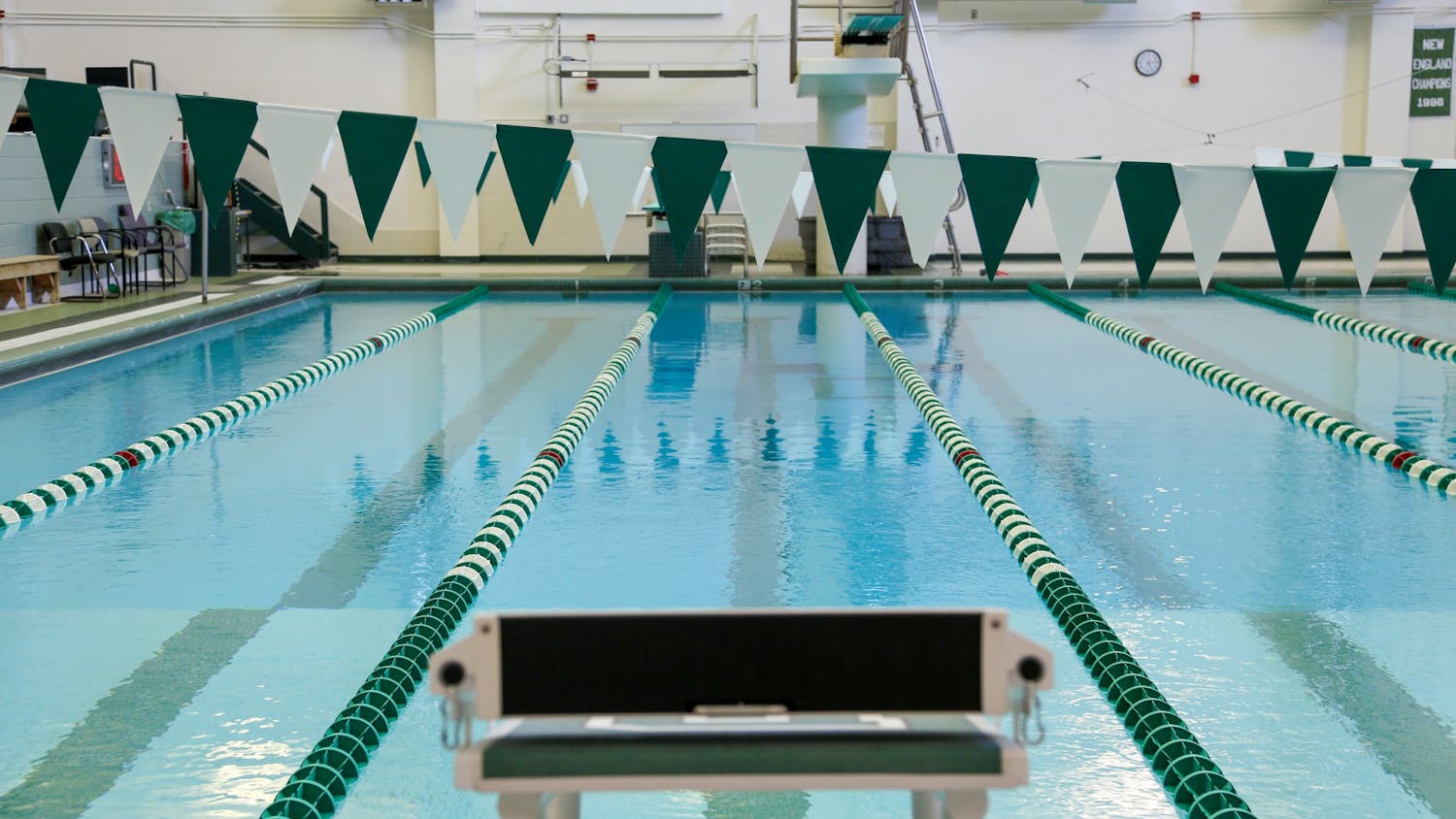The Ivy League announced on Thursday that all winter intercollegiate athletic competition has been canceled, with the start of spring sport seasons delayed until at least the end of February. The league added that postponed fall sports — including football — will not be moved to the spring. For the third time this year, the Ivy League became the first Division I conference to cancel its upcoming athletic season.
The Dartmouth spoke with athletics director Harry Sheehy for an extended one-on-one interview on Friday, discussing a variety of topics, including the factors that went into the Ivy League’s decision, eligibility concerns for affected athletes, the anticipated response from other conferences and athletic plans for the rest of the 2020-21 academic year.
What did the Ivy League presidents consider when making the decision to cancel winter sports? What prompted the timing of the decision?
HS: In the past few weeks, the athletics directors handed the presidents a plan on how to return to competition if the availability of rapid testing was to happen and if the virus situation had gotten under control. That went in a week or two ago, and we got feedback from the presidents. They really appreciated the work and then I think what actually happened was — if you've been watching the news in the last seven days — it's gotten frightening in terms of the amount of spread of this thing. So I think at one point, even though I felt we handed in a very well-reasoned plan because we want our people to be able to compete when it's safe, I think the presidents looked at it and thought there was just no way to ensure student-athlete health and safety.
I think that our coaches were ready for that. I think many of the student-athletes were probably ready for that as you looked around the country and saw what was going on. This is a very unsettled time in our country. So while it still hurt to make the decision, I emailed College President Phil Hanlon right away and said, Phil, I get it, and I'm in agreement.
What was your personal recommendation for how we could get back to sports?
HS: It had to do with testing. But here's the challenge: The travel piece was insurmountable. Let's say for example, in Hanover — even though this is not the case now — let's say it was totally under control, and we felt like we could put our student-athletes on a bus and send them to other Ivy League schools. There's absolutely no guarantee that those campuses would receive visitors.
In my mind, the biggest question was whether the presidents were going to allow individual schools to do their own thing depending on their own local circumstances. The Ivy League presidents have never acted that way. It's usually been one for all and all for one, and I think they did that again in this case. This is not a knee-jerk reaction. The presidents gave this a lot of thought — they spent a good amount of time on it. And I think they arrived at the only decision that they felt was right.
What would have to change in order for spring sports to happen?
HS: We're going to have to see the numbers change. I think the big thing that's hanging out there is the vaccine. If the distribution is as well set up as they say it is, and we literally get hundreds of millions of doses out into our nation, then I think the spring has a chance. We've frozen competition until the end of February in the spring because normally, we would have already sent baseball and softball to tournaments in the south.
December and January are going to paint a picture for us. In a way, it's a math equation. It's just numbers. Right now, Pfizer and Moderna are talking about two or three vaccines showing up. That might be our hope to get our population inoculated. If that happens, then I think there's a chance for spring.
We just felt like it was important for our athletes to get some answers. I can't tell you the number of questions I've been asked since Sept. 1 where my only answer was “I don't know.” But we literally did not know many of the answers to questions as simple as “Are we going to play in the winter?”
With our policies about who's on campus when, we couldn't populate our teams. Princeton only has 300 students on campus right now. Harvard has already said that they will house only freshmen in the fall and only seniors in the second semester. They could not populate their teams now. As I said to our ADs, “How are we going to do this unless all eight schools privilege student-athletes?” I personally don’t think that’s fair to the rest of the student-body, as much as I would like that. That hurdle is still out there; we have not solved that one yet.
What was your message on Thursday night when you talked to the student-athletes, in particular for seniors, but also for the spring-sport athletes who are still holding out hope?
HS: I was a student-athlete. My entire staff were student-athletes. My basketball experience at Williams College transformed my life. I had great teammates, and I had a coach that I loved. So right away, my heart breaks for student-athletes to lose a season when they work so hard. They're so passionate about it. I just want to let them know that I get it, that my heart breaks. Now I'm not in their shoes right now. I'm older, and I've had my experience, so I can't say I feel exactly how they feel, but I understand it. That was the main message. One of the reasons that we encouraged the presidents to just delay the spring is because we have a cohort of student-athletes who would then miss their second season. That is a huge blow.
The message was one of a broken heart for them. I said this to our coaches last night, what we've really found out in this is that a sprained ankle or a hurt knee is not real adversity. We're in the middle of real adversity right now. I said to our coaches, this is exactly why our checks clear every month: to deal with the toughest of situations, to exhibit resiliency to a group of young people who need to see that in us now more than ever. I trust that we have a coaching staff here that will do that. We'll continue to find ways to develop the young men and women who play on our teams and we’ll move forward.
You’ve previously discussed your support for granting eligibility extensions to athletes whose seasons were canceled. How did you feel about the decision to grant eligibility extensions to fall and winter athletes?
HS: I’m fine with that. First of all, it's a broader NCAA concern. The NCAA actually got on that one early, which I give them credit for. It's simply a matter of whether our eligibility rules allow our student-athletes to partake of the NCAA’s decision. We'll be working very closely with compliance and the D-Plan situation for our student-athletes to help them craft a path forward that works for them. I was talking to Tiffani-Dawn Sykes, who's a senior administrator with us — the head of compliance — and I said, “you better be ready because your phone is going to be ringing here pretty soon.”
Last year, I encouraged us to think about allowing the student-athletes who were admissible to graduate school on campus to go to graduate school and play their final year, and it got voted down. Phil was on board; I was on board. I actually said to the ADs, “I don't care whether Dartmouth would benefit from this or not. I want any student-athlete who could possibly finish their career at an Ivy League institution to do that.” We have the MALS program, which certainly some of our student-athletes would have would have looked at. But instead, our very best lacrosse player is playing at the University of North Carolina at Chapel Hill, and our very best track person — one of the best we've ever had — is running for Duke University. That just seems silly to me.
Would student-athletes have to get into graduate school on their own, or would they all get in automatically to compete?
HS: No, they have to be admissible. To me, that has to happen anyway. For example, former Dartmouth women’s lacrosse player Katie Bourque ’20, who tore her ACL a few days ago, had to be admissible to UNC’s graduate school. Right now, the way the rule stands, it wouldn't matter if someone got into our MALS program, Thayer or Tuck; they're still not eligible to play because in the Ivy League, you can’t participate in athletics as a graduate student. My whole thing last year was to give them a one-year waiver. We don't need to make this the rule, but this is an extraordinary circumstance that these folks have had to live under. Give them a one-year waiver, league. Then, if you actually are philosophically against graduate students playing at the Ivy League, even though they've been admitted on their own into a graduate program on our campuses, if there's something philosophically wacky about that that you don't like, just end it. But for this group with what they've gone through, I actually thought it was a little heartless not to do it.
Another piece of news from Thursday was that fall sports won't be moved to the spring. Can you talk about the rationale for that decision? If spring sports are able to be played, why was the decision made now that fall sports would not be moved?
HS: The only way that fall sports would play in the spring is if spring sports were playing. If spring sports weren’t playing, the situation would not have changed enough for fall sports to join them. I dealt with this very early on, because this came up right away months ago. I said to Richard Whitmore, who's a senior associate and runs the operations of our department, “I want you to look at this and tell me if this is feasible.” I think all eight Ivy League schools came up with the same answer: It's actually unmanageable.
I'll attack this from a couple ways. Number one is staffing. Right now, our staff, sports medicine equipment, those guys are flat out in a regular season. When you add another whole season and put it on top, you've got some real problems for them. Number two, from a facilities standpoint, if you try to imagine playing a baseball doubleheader on a Saturday afternoon in the spring and a home football game — if you've seen a baseball game, you've seen balls flying in the football field, bleachers and track on a regular basis. Frankly, it's a liability nightmare. From a staffing and facilities standpoint, it would be so taxing to all eight departments. It just became unworkable. Richard Whitmore said to me, “I'm going to look at that, but my initial reaction is, it's going to be really hard to do it.”
What I'm really hopeful for is that those fall teams will get their non-traditional seasons. So football gets 12 practices and a scrimmage. I'm hopeful we can just get that back, so that all the fall teams, the soccer teams and all those people that get spring practice in a limited capacity will be able to do that.
Unlike the Ivy League, many conferences went back to playing this fall. Do you expect that we'll see more winter and spring cancellations in line with the Ivy League's decision?
HS: The major revenue drivers are played in the fall in the winter: football and basketball. They will kill themselves to try to get those in. There’s a website called D1.ticker that gives you a synopsis of all the day's news in little short pieces across the country. For three weeks, all it's been about is cancellations of contests, postponement of contests and the desire of institutions to try to keep playing. Every other story is about how much money other schools are going to lose or have lost.
You get to see that the model that's present in the rest of Division I is unsustainable. What this time has really shown us is that if you don't play football, you cannot have a broad-based program at that level. My budget is part of the educational mission of the College. I have revenue expectations, but it's not $75 million from football or $35 million from basketball. I'm not dependent on any of that. Where it did hit us is that every year, I would get a check for somewhere over $500,000 from the NCAA, which we would plug into our budget, and that shrunk to about $170,000 this year.
As this goes on, we're going to start to be impacted because when you count on that money, it becomes a part of your budget. This year, we’ve managed to plug all the holes, but I don't know what's gonna happen next year. The check won't be bigger, that's for sure. We're gonna have to try to make some decisions on how we do this to the best of our ability. On the other hand, we're saving some money this year, because we're not playing anything. I'd rather not save money that way.
What do you think the fallout of this decision will be not only financially, but also long term on Dartmouth sports?
HS: I think because the philosophy that we're founded on is so good and right, I think that actually once we get through this, we'll be fine. There may be a little bit of trying to get our sea legs again, but that's going to go on all over the country. This is something where I think every one of those Division I schools needs to look at this and realize if this was ever to happen again to football, they have a real problem. Teams all over the country are furloughing people, cutting positions and dropping teams. This is real. This has exposed a lot more in terms of how Division I athletics are funded.
When fall sports were canceled, five sports were eliminated the next day. You’ve said before that there would be no further cuts. Just to clarify, is that still the case?
HS: Yep. Let me put a little bit of extra clarification on that. I cannot speak for what the next president or the next athletics director will do. But for this president and this athletics director, we spent lots of time on this, and we felt like this is where we needed to go. I don't think Phil or I look at any other programs right now and say they have to go, or we need more money because of that, or we need more money and there's the only place we can get it. So I'm very confident in what Phil has told me.
Have you received more or less backlash compared to when the Ivy League canceled spring and then fall athletic competition?
HS: Right now it's less, but I just got up. I'm expecting that there will be some. We’re in a dramatically different place emotionally as a country right now. I think this one is easier for people to accept. All they're reading about is the “twindemic,” when influenza and the pandemic hit us at the same time. They're reading about the number of cases, that 1,000 people a day are dying, that there isn't a state where it's not spreading, including rural states, including our own state of New Hampshire. I think people have a different understanding of what's going on now relative to the fall and last spring.
We've seen the return to practice protocol that's gone on this term. Will the teams who have had their seasons canceled continue practicing?
HS: The reality is, we're a few days away from leaving campus. For a team that has maintained itself in phase one or two, we will allow that to keep going. We're going to learn a lot between Nov. 17 and Jan. 7. We're really going to have some patterns and trends and see where things are. When we come back, we've got to start all over again in terms of the phased-in approach. For the great majority of time, our student-athletes have been wonderful and have done an unbelievable job of maintaining the community standards that we've asked them to. It's not without a glitch or two, but I'm really proud of our student body in general. This community was worried about students coming back, and many people advocated for not bringing students back. I think our students have behaved with a maturity beyond their years for the most part.
This interview has been edited and condensed for clarity and length.




